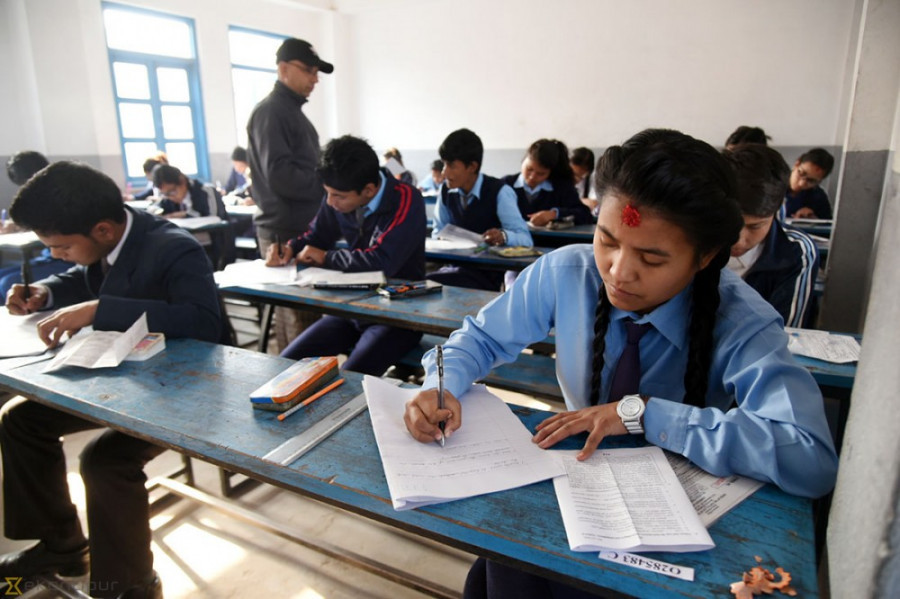National
With schools grading their SEE students this year, there is a concern about test score inflation
Looking at the past trends of internal evaluation, education experts say schools are unlikely to grade their students in an impartial manner.
Binod Ghimire
With no prospect to hold the Secondary Education Examination due to Covid-19 pandemic, the government on June 10 decided to cancel the test for this year and issue test certificates to the students based on internal evaluations of their respective schools.
As per the plan, the schools will send their evaluation scores to the Education Development and Coordination Unit at the district level and the National Examination Board will authenticate them and issue the grade sheets accordingly.
As many as 482,219 students had registered for this year’s SEE.
The decision to scrap the examination was taken following growing calls from various sectors, as there was an uncertainty about the test taking place due to the lockdown.
The decision, however, has raised the question over the fairness in the evaluation process, as schools, mainly private ones, have a tendency to inflate the obtained marks, education experts say.
Out of eight subjects with 800 full marks, schools so far have been marking the students’ performance for two practical subjects worth 25 marks each.
Officials at the board say they have many examples where students obtaining five marks in theory with 75 marks as total weightage have obtained full marks in practical.
The broad conducts the test for theory while the schools decide the scores for practical tests.
Chandra Mani Poudel, chairperson of the board, said they have been witnessing that the students with below average performance in written theory tests have obtained full marks in practical.
The trend is not limited to SEE alone. Similar practice is prevalent in grade 11 and 12 finals as well.
For instance, among 90,364 students who took the test of Population Education in grade 11 last year, only one student had obtained A+ in a written theory, the test conducted by the board. However, those getting the highest grade in practical were 40,571.
Similarly, no students among 104,000 who took the theory test on the subject of Health managed to secure an A + grade in theory. However, 31,000 students got A +, and 50,000 got A in their practical tests.
“As schools have free hands now, we are sure the marks will be inflated by many schools,” Poudel told the Post. “But, we are not in a position to verify the scores.”
The Cabinet meeting on June 10 decided to allow schools to rate the score of their students through internal evaluation, but there is no monitoring mechanism to ensure that the students are genuinely rated.
Poudel said they are preparing a format that schools will have to follow to dispatch the marks ledger of their students. The board will convert them to the grade sheets and publish the results accordingly. The process is expected to take at least a month.
The education experts also say looking at the past trends, it is hard to believe the gradings conducted by schools would be genuine.
They say the tendency among the schools to boast themselves based on the results of SEE, Grade 11 and Grade 12 has created an unhealthy competition.
“I doubt the marks provided by the schools would portray the true learning achievement of their students. The government must have formed a mechanism to monitor the evaluation process,” Binay Kusiyait, a professor at Tribhuvan University who has conducted several research on school education, told the Post.
He said as the constitution provides local governments to manage the school education, the Cabinet should have decided to form a monitoring mechanism at the local level to oversee the evaluation process. Each local government has an education committee led by the chairperson.
“If schools care about their students, they would not engage in such malpractice. The SEE results give students an opportunity to evaluate themselves where they stand and plan for the future accordingly,” Ritu Raj Sapkota, chairperson of National Private and Boarding Schools’ Association Nepal, told the Post.
“Students shouldn’t be fed an illusion, least of all by their own schools, by inflating their test scores.”




 13.12°C Kathmandu
13.12°C Kathmandu














